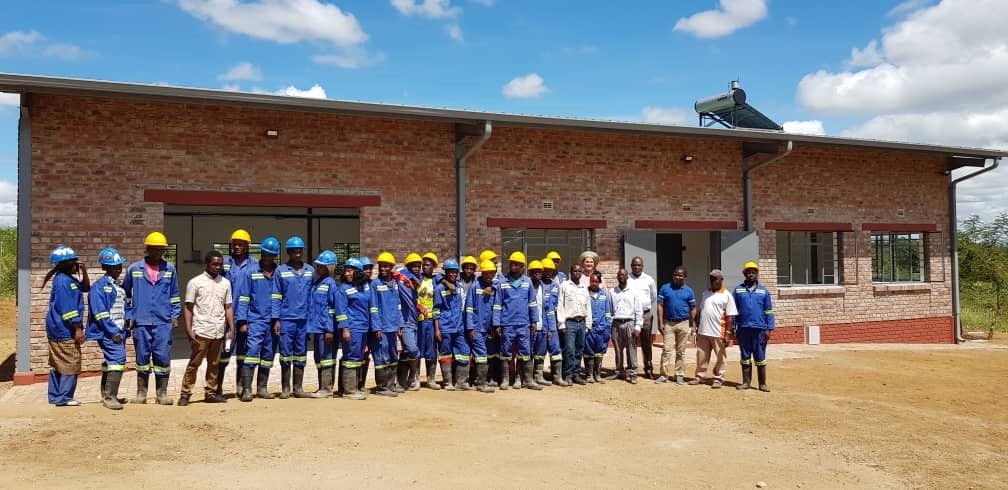
Development Aid from People to People (DAPP), Zimbabwe
Overview
Zimbabwe’s rate of unemployment in 2019 was 16.9%. Youth unemployment was 27.5%, while 44.8% of young people was neither employed, being educated or trained. Reasons include lack of opportunities and capital, and the disconnect between industry needs and the training curricula of TVET colleges. To address these, DAPP Zimbabwe partnered with the public and private sectors to offer industry-oriented training with funding from VET Toolbox and co-funding from European Union and German Cooperation, with Enabel, a Belgian Development organization as the contracting authority . The project was implemented from November 2019 to February 2022 following a 4 months extension after October 2021.
The target was 400 youth (18-35 years), of whom 200 were female and 60 youth with disabilities. However, 437 students (223 male, 214 females, 58 SWD (27 male and 31 female) were enrolled.
The project’s overall goal was to improve vocational education and training and transition into labour market among disadvantaged and vulnerable youth in the Shamva and Bindura districts of Zimbabwe.
The implementing partners were DAPP Zimbabwe, Ponesai Vanhu Technical College(Private VET Center owned by DAPP), Chaminuka Vocational Training Centre (a Government owned VET Centre), Bindura University of Science Education and Leonard Cheshire Disability Zimbabwe (a disability service organization). Relevant government departments were also involved in the daily implementation of the project.
Good Practice Approach
Community-based approaches helped create the buy-in of local traditional, political and religious leaders, who were instrumental in ensuring community participation and selection of project beneficiaries. Another community-based approach was that of incorporating young people’s preferences in designing the courses through incorporating recommendations from the baseline survey conducted by Bindura University, in which young people expressed a desire for skills relevant to their societies.
By facilitating the creation of strategic public private partnerships to promote vocational skills development, the project capitalised on the strengths of each organisation to promote access to relevant vocational skills training courses. To delimit roles, DAPP signed partner agreements with each partner. The project consulted relevant industries to make course adjustments so that training offered met the interests of the market. The new and adjusted courses offered at the two colleges are:
• Auto-electrics and electronics
• Electrical engineering
• Carpentry
• Clothing and textiles
• Metal fabrication
• Smart agriculture
• Building
• Confectionary and bakery studies
• Maintenance and repair of electrical gadgets
• Motor vehicle maintenance
• Computer operations
Training was divided into three parts consisting of four months’ theoretical training, followed by four months’ practical attachment in the industry. The courses concluded with an examination.
A project management unit (PMU) of representatives of implementing organisations monitored progress through regular meetings. A project steering committee (PSC), comprising 12 representatives of the public and 24 private companies and 20 student representatives (5SWD; 10 female), enhanced efficiency, effectiveness and sustainability.
20 Peer groups for girls and youth with disabilities were formed to help them gain confidence, provide encouragement and promote each other’s interests during and after college.
Key Results
• 437 students (214 females, 223 males among them 58 YWD) enrolled in the 12 courses in 4 intakes.
• 82 % students completed training (49% female; 16 %SWD) and received certificates
• 50 start-up kits awarded to 50 students whose business plans were selected by the PSC from a total of 185 applications
• 58% (209) graduates were self, formally and informally employed (48% female ; 8% SWD)
• Established ‘graduate internship’ for skills internalization and strengthening
• 12 short vocational skills courses have been accredited by Bindura University of Science Education (BUSE) and certificates of competency were awarded.
• A networking group for the students to support each other and share employment opportunities has been established.
Lessons Learnt
Success Factors
o The involvement of local leaders ensured optimum participation and support of local drivers of the project which promotes sustainability.
o Inclusivity ensured the involvement of girls and young women (comprising 49%) and youth with disabilities (13.3%).
o Funding from the VET Toolbox, co-funded by the European Union and German Corporation through Enabel assisted 437 youth from humble backgrounds to access training and attain vocational skills through scholarships.
o Developing courses using input from industry added industry insight and made the short courses relevant to market needs.
o Signed and verbal agreements with the private sector and government departments facilitated the placement of youth for on-the-job training.
o Follow-up during industrial attachment has helped the college identify areas of improvement for groups that are still in theoretical training.
o Active Project Steering Committee which promoted collective resolution to challenges during project life and sustainability of results after project end.
o VET Graduate youth require tailor-made support as they transition into employment (self, informal or formal)
Challenges/Barriers
• Covid-19 disrupted training activities. To overcome this, the project introduced e-learning. However, this proved a challenge as only 33% of the first intake of 110 students could access lessons. This was because the youth come from impoverished families who had neither access to smart phones nor data bundles. When lockdown restrictions were eased, a satellite training station was established to enable in-person training while observing Covid-19 regulations.
• Access to formal employment for YWD remains a challenge and thus the project had to allocate 30% of the toolkits to graduating SWD so that they are self-employed.
Moving Forward
The future of the programme is to establish it as a hub for vocational skills training maintained by the government at Chaminuka Vocational Training Centre and private sector at Ponesai Vanhu Technical College. Further alliances will be sought so that the colleges offer competitive courses. Relationships established through the public private partnerships will continue and the inclusive infrastructure will serve the youth with disabilities who aspire to participate in vocational training. The two VET centers are offering the short courses to students with scholarships from the Government and other private oganisations.
Resources
https://dapp-zimbabwe.org/ https://dapp-zimbabwe.org/

Country Director: Luckson Soda
Email Address: dappzim1@mweb.co.zw or dapppind@mweb.co.zw
Cell Number: +263772419705 or 0772 419 703
PVTC Principal: Edwick Mafama
Email address: edwickmafama@hotmail.com
Cell Number: +263783705216


